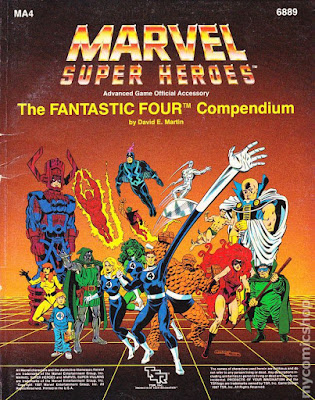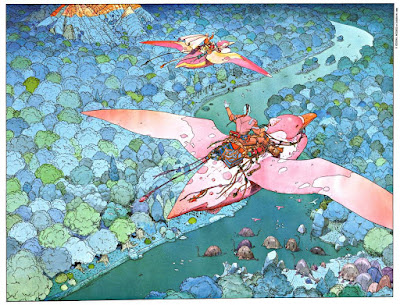The "dead" RPG I would like to see reborn is the old Marvel Super Heroes FASERIP system from TSR in the 1980s. It can't be declared truly dead since so many people are still playing it and all of the PDFs from its original run are free online. But it is out of print and no one is taking advantage of all the game design improvements of the last 30 years to tighten up the game and improve the play experience.
That's not a criticism of the game. It was both ahead of its time and a product of it. The resolution chart for success, in particular, was en vogue in game design for a while in the early 1980s but disappeared quickly. Still, much of what makes the game work well found its way into modern games like FATE. I wrote a post about that along time ago. The wonky experience system that is burned for luck is a feature I find in more games lately as well. The experience rewards themselves are a brilliant way to encourage play that gets the kind of situations that happen in Marvel comics all the time.
 |
| The infamous chart. I remember we had a cardboard wheel that worked the same as the chart for a while too. |
The biggest barrier to a renewed Marvel Super Heroes game is licensing. Back in the 80s Marvel likely saw an RPG as a way to expand their market on the rising tide of D&D's insane success. Their properties also weren't worth what they are today, thanks to some outlandishly successful movies and small screen offerings. The recent Marvel Heroic RPG collapsed under the weight of the licensing agreement Margret Weiss Productions made to get it. Their game existed for a year before that dream died. There were other problems with the game, notably a lack of original character generation, but any other publisher is going to have to deal with a similar financial imbalance. RPGs have shrunk as a market and Marvel as an IP has gained a whole new level of success. The viral success necessary to afford to keep the license is difficult to manufacture.
That said, this is about what I want, rather than what I think can happen. I'd like to see the FASERIP rules streamlined and cleaned up a bit. It could be brought into the 21st century with a few tweaks. Maybe that chart could be replaced with a target number system? Maybe the percentile dice could be dumped for something more simple, like a D20? The details are less important than the core game moving forward and evolving.
 |
| You won't see one of these in the new game! :P |
There are plenty of old adventures available from Classic Marvel Forever, but I'd like to see some new ones. How about a Marvel Cinematic Universe Sourcebook? That's a way to make a grab for new fans.
The Marvel Universe has grown and changed a lot since the game went out of print. It would be amazing to see what could be done with it all now.
Note: If you are reading along, you might notice that I'm skipping days here and there. Part of it comes from my schedule, which is quite busy in the summer, and part of it comes from me finding some of the topics uninspiring. I know I called this process microblogging and a big part of it for me is to rebuild my blogging habit, but I'm not going to pull something out of my ass or write a single paragraph for the sake of checking off a day.






















